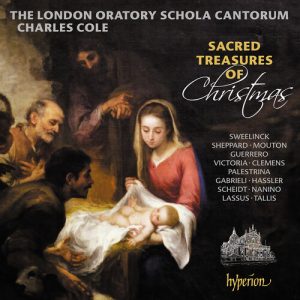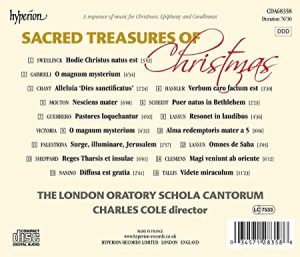AVAILABLE NOW FOR PRE-ORDER at the CMAA ONLINE SHOP.
SACRED TREASURES OF CHRISTMAS is a new recording from the boys of the London Oratory Schola, directed by Charles Cole. The Schola is one of the top boys’ choirs in the world and sings at the London Oratory. The boys, aged 8-18, are all pupils at The London Oratory School. 
The Choir’s Director, Charles Cole said: “We are delighted to present our newest album which we recorded earlier this year. ‘Sacred Treasures of Christmas’ focuses on some of the most iconic polyphonic works written for the Christmas liturgy. These motets, rendered so beautifully by the greatest masters of the Renaissance, capture the awe, mystery and effusive joy of the Nativity.”
Sacred Treasures of Christmas, a sequence of music for Christmas, Epiphany and Candlemas, continues the ‘Sacred Treasures’ series, an anthology of sacred repertoire drawn from the liturgical motets which the boys sing at the London Oratory.
 Charles Cole continued: “Through these recordings, the Schola seeks to bring to a wider audience the music which adorns the liturgies at the London Oratory. These motets have an important function within the liturgy and are not solely beautiful works of art to be appreciated in a removed context such as a museum or art gallery. Their sacred purpose, the way they are experienced by the boys who sing them, and the manner in which they are heard at the Oratory, are before all else within the liturgical context.”
Charles Cole continued: “Through these recordings, the Schola seeks to bring to a wider audience the music which adorns the liturgies at the London Oratory. These motets have an important function within the liturgy and are not solely beautiful works of art to be appreciated in a removed context such as a museum or art gallery. Their sacred purpose, the way they are experienced by the boys who sing them, and the manner in which they are heard at the Oratory, are before all else within the liturgical context.”
The motets on the new album celebrate the Nativity itself, before moving on to the Feast of the Epiphany and the Adoration of the Magi, and concluding with the Purification of the Virgin. Amongst the composers represented are Victoria, Guerrero, Palestrina, Lassus, Clemens, Sheppard and Tallis.
Sacred Treasures of Christmas from London Oratory Schola on Vimeo.
For more information, visit Hyperion or the London Oratory Schola websites.
PRE-ORDER YOUR CD NOW FROM THE CMAA SHOP
Also Available at these outlets:
